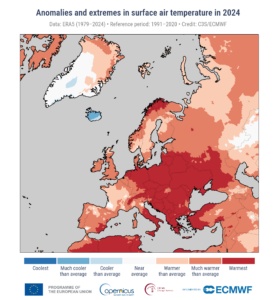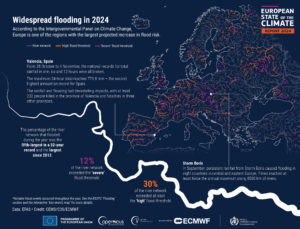Climate: 2024 an extreme year for Europe amid floods and record heat
Brussels – Europe is getting hotter and hotter, with 2024 being the warmest year on record since there have been satellite readings. It shows that climate change continues to seriously threaten the EU despite mitigation efforts, prevention, and sustainability goals. Outlining the unenviable picture is The European State of the Climate 2024 report on the health of the EU’s climate that the European satellite observation service Copernicus and the World Meteorological Organization (WMO) published today (April 15).

The main result is the extreme heat: 2024 was the hottest year in Europe since the systematic monitoring of temperatures. The weather phenomena that characterized it were also abnormal, such as the violent storms and floods that hit areas inhabited by 413 thousand people, causing at least 335 deaths, or the visible contrast between the eastern part of the Continent, struggling with heat and drought, and the western part, whose climate was mild and rainy.
The report points out that floods are business as usual, made more frequent by high temperatures and proven catastrophic, as in the case of storm Boris, which hit central Europe in September and also affected Romagna. Just a month later, it was the turn of the floods in Valencia. Two extreme weather events that together caused over 250 deaths.
During the year, 30 percent of Europe’s river network exceeded the “high” flood threshold, and 12 percent exceeded the “severe” threshold. In addition, the Intergovernmental Panel on Climate Change data lists Europe as one of the areas of the world that will be most at risk of flooding in the future.

2024 flooding data (Source: Copernicus)
“This report highlights that Europe is the fastest-warming continent and is experiencing serious impacts from extreme weather and climate change,” warned World Meteorological Organization Secretary-General Celeste Saulo. “Every additional fraction of a degree of temperature rise matters because it accentuates the risks to our lives, to economies, and to the planet.” In this context, “adaptation is a must.” In this context, “WMO and its partners are therefore intensifying efforts to strengthen early warning systems and climate services to help decision-makers and society at large to be more resilient,” she added. However, Saluto acknowledges that there is still work to do. “We are making progress but need to go further and faster, and we need to go together.”
The Defense and Space Commissioner Andrius Kubilius spoke of “alarming results” but welcomes the Copernicus satellite observation service. “It makes a critically important contribution to the EU’s resilience and preparedness” in the face of climate challenges, he says, commenting on the report. “This is true both for what concerns the EU’s efforts in mitigating the effects of climate change and for the new economy that may result.”
Despite experiencing higher temperature increases than the global average, the EU is the major world economy that cuts climate-altering emissions the fastest. With this in mind, Brussels plans to reach zero emissions by 2050 and may announce a goal of a net reduction of 90 percent of these by 2040 this year, hoping that the effects of the forthcoming policies will outpace the deepening climate crisis.
English version by the Translation Service of Withub
댓글
댓글 쓰기